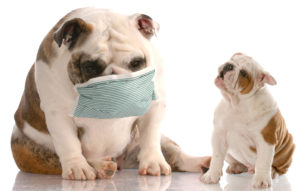Mystery Respiratory Illness 2023

In the ever-evolving landscape of veterinary health, 2023 has presented a new challenge for our furry companions— a respiratory illness that has left animal health experts across the country perplexed. Let’s delve into the details of this mysterious ailment, its symptoms, potential causes, and the ongoing efforts to manage and understand it- not to mention what we’re doing about it here at Highland Pet Hospital.
Since this is a respiratory disease- it can be spread through close contact, which is why most pets who have been affected have one thing in common. That commonality is they have spent time where dogs are in close contact, either boarding facilities, dog shows or dog parks. We truly expect this to get worse before it gets better with the number of pets that will be staying in boarding facilities this holiday season.
We are requesting any pet parents whose pets are exhibiting any symptoms of the illness to remain in their cars until their scheduled appointment time to minimize any contact with other patients. Exam rooms will be thoroughly cleaned and sanitized following their visit with our veterinarians.
What’s happening?
Reports started surfacing early in the year about an uptick in respiratory issues among dogs. Since the majority of our patient visits are for reproductive services, we’re not seeing a lot of patients exhibiting symptoms, but our sister hospital in Tampa has seen increased numbers of coughing pets. Pet parents have reported symptoms such as coughing, sneezing, nasal discharge and in a few cases, lethargy and inappetence. In some cases nationwide, severe cases have led to cases of pneumonia and death in some patients.
Symptoms and Clinical Presentation
The affected dogs typically exhibit signs of upper respiratory tract infection. Coughing, often accompanied by a honking sound, is a common manifestation. Nasal discharge, lethargy, and loss of appetite may also be present. In more severe cases, dogs may struggle to breathe, necessitating immediate veterinary intervention. Since we don’t know the pathogen causing the issue, we don’t know the incubation period or the timeframe from exposure to signs of symptoms. Nor do we know how many pets may spread the virus while being asymptomatic. Diagnostic testing for most common respiratory illness comes back negative, despite the patient showing chronic symptoms.
At this time, there is no ‘cure’ for the illness, and palliative care to treat/manage the symptoms is the suggested route. Some pets have improved on medications, while others have not responded to any degree. Doxycycline may be the best course of treatment, as it helps prevent the growth of bacteria- but doesn’t kill it. Antibiotics don’t seem to have much, if any effect on the illness.Some other diagnostic testing may be recommended to assist in a differential diagnosis to rule out the mystery virus. A cough does not necessarily mean your pet has the virus- as a cough is a vague symptom that still needs to be diagnosed to find the cause. Coughing, or other symptoms may be caused by a completely different underlying illness or condition- so diagnostics will still likely be needed to come to a diagnosis.
Potential Causes
Several theories have emerged regarding the origin of the mystery illness. Environmental factors, new strains of known viruses, or the introduction of a previously unidentified pathogen are all under consideration. The close-knit nature of the dog community, particularly in areas like dog parks and boarding facilities, has also been examined as a potential factor in the rapid spread of the illness. Research done at the University of New Hampshire is pointing to a tiny, previously unidentified bacteria which is hard to find and sequence. This report gives us hope, but much more research is needed to better understand how to combat it.
Preventive Measures
In the absence of a definitive cause, veterinarians are advising pet owners to take precautionary measures to protect their dogs. This includes minimizing exposure to crowded areas and unfamiliar pets, ensuring up-to-date vaccinations, and seeking prompt veterinary attention if respiratory symptoms arise. While ensuring your pet is vaccinated for Bordetella and the latest strains of Canine Influenza is a good idea, it is not a guarantee that your pet will be fully protected against this new virus or bacteria.
We will continue to monitor the situation. As stated before, this has the potential to get worse before it gets better due to the timing with the holidays and with so many pets being in boarding facilities, or out and about with their families at the local dog parks. When we have more to report, we will update this blog, so stay tuned.


 Tap to Call Now
Tap to Call Now